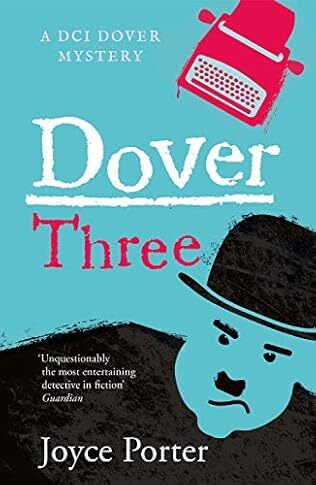Dover Three

A review of Dover Three by Joyce Porter – 250826
It takes a particular type of skill to be grossly obnoxious, lazy, a sponger off anyone foolish enough to show any signs of a hospitable nature, to jump to conclusions, to grasp the wrong end of the stick, to loathe the prospect of any sort of physical exertion and yet be able to come out of a catalogue of disasters smelling of roses by having the solution to a perplexing crime handed to you on a plate. Such is the genius of Chief Inspector Wilfred Dover, Joyce Porter’s consistently repellent detective creation, who is the larger than life star of this romp of a novel, originally published in 1968.
A spate of the most obscene poison-pen letters imaginable that have been received by many of the female residents of the village of Thornwich is not a matter that troubles the mighty grey cells of the Yard but Dame Alice, the local bigwig, has influence. Frustrated by the lack of progress on the part of the local force she brow beats the Chief Constable, Mulkerrin, to hand the case over to Scotland Yard.
Seeing manna falling from heaven the Assistant Commissioner immediately packs off his most incompetent detective, the grossly overpromoted Dover, to see what he can make of it. Accordingly, accompanied by the long suffering MacGregor, upon whom indignity after indignity is inflicted upon, the portly detective finds himself ensconced in the less than salubrious surroundings of the Jolly Sailor.
Dover’s immediate thoughts is that the perpetrator is a woman and that she would have sent herself some of the letters to cover her tracks. Drawing up a short list of the recipients of the most letters, he sets out to interrogate them, although not with much haste as he is minded, because of his sister-in-law’s visit to his home, to spin it out until she has gone. The first victim of his curious interrogation style is a schoolmistress, Miss Gullimore, who immediately attempts to take her own life. The state of her underwear leads Dover to believe it was not a serious attempt.
In the bosom of the Jolly Sailor Dover enjoys the largesse of Mr Tompkins, a local shopkeeper who has won a large sum of money on the football pools. Tompkins’ wife is the next recipient of letters that seems to commit suicide, this time successfully because, of course, she was wearing underwear. MacGregor’s dogged pursuit of the truth behind la Tompkins’ demise leads to the discovery of a baby farming operation, Mr Tompkins’ predilection for enjoying French lessons on a Wednesday afternoon, a genuinely hilarious part of the book, the disappearance of a female who had not received any letters and Dover’s rather bold assertion in front of the assembled masses of the pub that that would be the end of the letters.
Of course, it is not and Dover even has the indignity of receiving one himself. The style of the letters, though, is different, produced using a John Bull-like child’s printing set and purplish ink rather than a typewriter, leading Dover to deduce correctly the letter writer’s original plan and erroneously the identity of the culprit. Satisfied that the matter has been dealt with and bucked by the news that his sister-in-law has gone returns to London via an overnight sleeper.
It is in the toilet of a railway carriage that Dover stumbles inadvertently across the real culprit in an amusing and ultimately tragic denouement. In truth, the culprit is not difficult to spot but this is a glorious romp of a farce with Dover, a martyr to his bowels and laid hors de combat by an encounter with Dame Alice’s dog, at his grossest best.
For a bit of light entertainment with a plot that has enough in it to hold the reader’s interest but is not too taxing, this is hard to beat. Perfect holiday reading!



